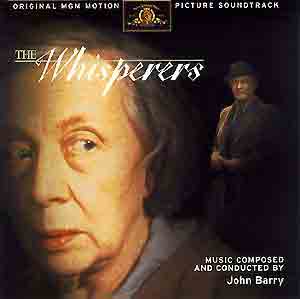The Music
This soundtrack was unusual for a couple of reasons, namely for the way John Barry worked with adapter/director Bryan Forbes. Typically (at least at that time) the film composer comes in toward the end of the movie, writes the score from a rough cut of the film, and then re-records the music for a soundtrack release later on. A lot of music in a movie is short--just a stub piece of music; so when a composer got to record the soundtrack album, he often re-arranged the music into something more coherent--something with a beginning, middle and end.
For The Whisperers, Barry was invited in at the beginning, and he began working on the themes and musical ideas while the film was being shot. This gave him a lot more time to develop his ideas and see the movie come together. He worked with the editors so that the music, the sound effects and the dialog worked together instead of competing for attention. Most importantly the record label, United Artists, fronted the money for the soundtrack at the beginning of the project. Barry worked out the themes for the movie and made them into the music that appeared on the soundtrack. When the movie was editied together, Barry then took those themes and put them into the film. As Barry put it, "the album pieces were full versions of the thematic material."
Considering the story, I thought the score would be desperately depressing as well, but it tends more toward Barry's wistful, bittersweet sound rather than something miserable. The theme is quiet and brittle, but it's also elegant. And happily there are different moods on the album--it begins and ends with the main theme, but there are other moods, so the listening experience is far from monotonous. I found it surprisingly rich and rewarding. |
Release Notes
The LP came out with the movie in 1967, but it didn't get a CD release until Ryko put it out in 1998 as an enhanced CD. They included bits of dialog between some of the tracks (bleah), but they made up for it with some very nice booklet notes and a good mastering job.
The title theme shows up on the compilations The Best of John Barry, The Film Music of John Barry and John Barry Conducts his Greatest Movie Hits. |
